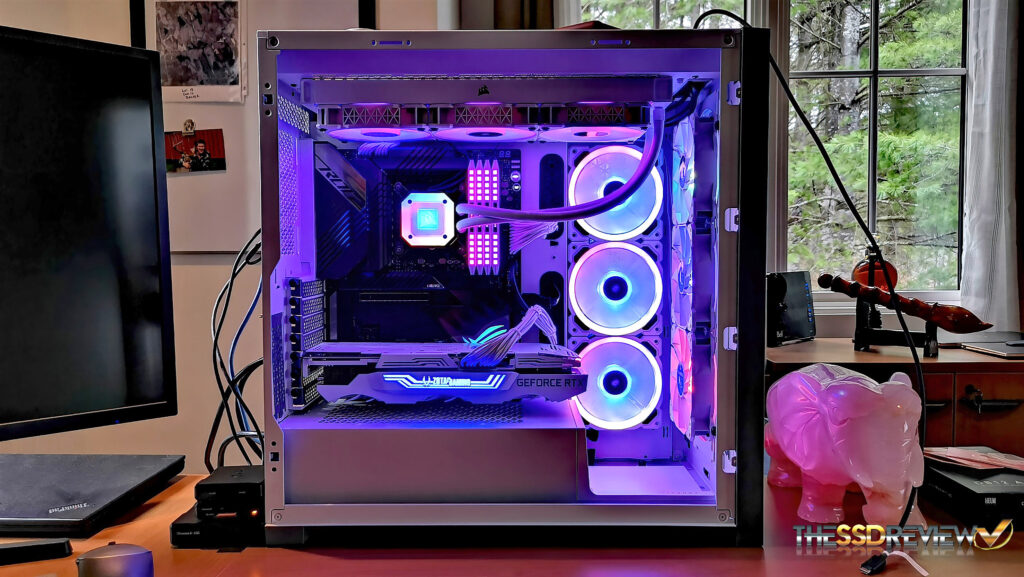TSSDR TEST BENCH AND PROTOCOL
SSD testing at TSSDR differs slightly, depending on whether we are looking at consumer or enterprise storage media. In today’s testing, we will be evaluating the TeamGroup T-Force Cardea A440 Pro Gen4 NVMe SSD in our newest Intel Gen 4 Test Bench. This PC has been optimized to provide the absolute highest performance available using our SSD Optimization Guide.
INTEL Z590 PCIe 4.0 TEST BENCH
For this Test Bench, the CPU C-States, Enhanced Intel SpeedStep Technology (EIST) and Intel Speedshift (P-States) have not been disabled. As you will see below, the system is also bumped to 5.3GHz with memory at full speed in its XMP 2 profile.
The components of this Test Bench are detailed below. All hardware is linked for purchase and product sales may be reached by a simple click on the individual item. As well, the title is linked back to the individual build article where performance testing can be validated. Clicking on the Title below will bring you to our complete report on this new Gen 4 PC system.
INTEL Z590 PCIE 4.0 COMPONENTS (Click for System Report)
| PC CHASSIS: | Corsair 5000X RGB White Tempered Glass Chassis |
| MOTHERBOARD: | ASUS ROG Maximus XIII Z590 Hero Gen 4 |
| CPU: | Intel 11th Gen Core i9-11900K |
| CPU COOLER: | Corsair Hydro Series H150i Capellix White |
| POWER SUPPLY: | Corsair RM850x 80Plus White |
| GRAPHICS: | ZOTAC GeForce RTX 3080 Trinity White |
| MEMORY: | Corsair Dominator Platinum RGB DDR4-3200 32GB |
| STORAGE: | Sabrent Rocket 4 Plus Gen 4 4TB NVMe SSD |
| KEYBOARD: | Corsair K70 RGB Mk. 2 SE White Gaming |
| MOUSE: | Corsair M65 RGB Elite FPS Gaming |
| MONITOR: | Samsung 34″ 1440p WQHD Ultrawide Gaming |
BENCHMARK SOFTWARE
The software in use for today’s analysis is typical of many of our reviews and consists of Crystal Disk Info, ATTO Disk Benchmark, Crystal Disk Mark, AS SSD, Anvil’s Storage Utilities, AJA, TxBench, PCMark 10, PassMark Performance Test, Final Fantasy XIV Gaming BenchMark, as well as true data testing. Our selection of software allows each to build on the last and to provide validation to results already obtained.
CRYSTAL DISK INFO VER. 8.11.2 X64
Crystal Disk Info is a great tool for displaying the characteristics and health of storage devices. It displays everything from temperatures, the number of hours the device has been powered, and even to the extent of informing you of the firmware of the device.
Crystal DiskInfo validates that our SSD is running in PCIe 4.0 x4, using the NVMe 1.4 protocol and confirms that it is TRIM capable. You might also notice that bright red temperature reading of 60°C which is the highest temperature we could achieve during our testing, validating that the aluminum cooler does its job well.
ATTO Disk Benchmark is perhaps one of the oldest benchmarks going and is definitely the main staple for manufacturer performance specifications. ATTO uses RAW or compressible data and, for our benchmarks, we use a set length of 256mb and test both the read and write performance of various transfer sizes ranging from 0.5 to 8192kb. Manufacturers prefer this method of testing as it deals with raw (compressible) data rather than random (includes incompressible data) which, although more realistic, results in lower performance results.
ATTO performance hits highs of 6.64GB/s read and 6.28GB/s write which are great speeds for this ATTO benchmark.
 The SSD Review The Worlds Dedicated SSD Education and Review Resource |
The SSD Review The Worlds Dedicated SSD Education and Review Resource | 


Page 2
“ATTO performance hits highs of 6.64GB/s read and 6.28GB/s write which are **up** great speeds for this ATTO benchmark.”
I don’t understand this grammar (see asterisked text).
Corrected and thank you for reading the report and p[roviding input.
Les
Thanks for test. Was quite for some time here.
Here is my suggestion I once mailed, but got no response 🙂
Could you testers please start to do more real life testing of programs, data transfers etc.?
There is zero benefit of all those benchmark programms, which do basically do the same.
Crystal Disk, Atto Disk, AS SSD, Anvil storage, Aja etc. are all redundant. You guys can keep 1 – 2 and it is enough.
All these benchmarks are like fillers – remove them and the test becomes 1 page only 😉
You guys have to make a decision between easy doable test but with little value and more complex and time consuming test but with more value and actual meaning for yourself and the readers.
The companies sending the samples do want sugarcoated benchmark-test only, showing optimised sequential tests only?
Especially a big and fast 2TB ssd like this, would benefit from some actual file tests of videos, data, slc-cache, fill rate, multiple write intensive programs simultaneously, and other details.
Thanks!